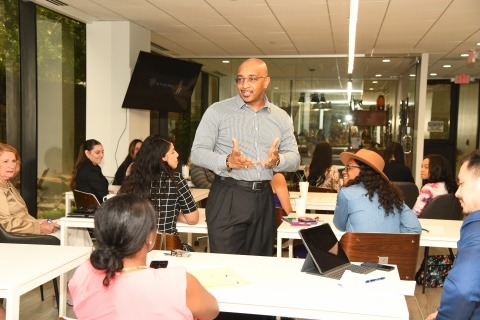Looking Ahead – The Evolution of Coaching Education

Coaching has rapidly evolved from an informal practice into a recognized profession that influences executive leadership, personal development, and organizational performance. But with its rising popularity comes a pressing challenge: ensuring coaching remains credible, ethical, and effective. To be part of the Evolution of Coaching rigorous training is more critical than ever.
As someone who has dedicated years to mastering evidence-based coaching methodologies, I’m passionate about raising industry standards and ensuring that coaching remains a structured, research-backed profession. I’ve seen firsthand how high-quality coaching transforms lives and careers—and I’ve also seen the consequences when coaching lacks proper training and ethical oversight.
That’s why my upcoming conversation with Anna Tavis, Ph.D., Chair of the Human Capital Management Department at NYU’s School of Professional Studies, is both timely and necessary. We share a deep commitment to coaching excellence, ethical practice, and professional accountability. As coaching continues to gain traction in corporate, healthcare, and high-performance industries, ensuring coaches meet rigorous standards is no longer optional—it’s essential..
Why Rigorous Coach Training is More Critical Than Ever
The increasing presence of coaching in executive leadership, healthcare, and organizational development underscores the necessity for professionalization within the field. However, as demand rises, so does the risk of dilution—where individuals with minimal training position themselves as experts. This makes structured, accredited education more critical than ever.
Key reasons for prioritizing rigorous training include:
1. Protecting the Integrity of Coaching
Professional credentials from organizations like ICF and NBHWC serve as a benchmark for coaching excellence.
These certifications are not just honorary titles—they reflect a coach’s depth of training, adherence to ethical standards, and ability to apply evidence-based coaching techniques effectively.
Certified coaches must meet rigorous requirements, including:
Operating Within a Clear Ethical Framework – Ethical coaching isn’t just about good intentions; it’s about adhering to established professional guidelines that protect clients and maintain the integrity of the profession. Certified coaches are trained to recognize boundaries, confidentiality concerns, and power dynamics that arise in coaching relationships.
Applying Scientific, Research-Backed Methodologies – Coaching is more than offering motivational advice. A well-trained coach integrates behavioral neuroscience, positive psychology, and cognitive-behavioral strategies to help clients achieve measurable outcomes. These approaches ensure that coaching interventions are effective, sustainable, and grounded in real science—not just intuition.
Upholding High Professional Standards – Organizations, businesses, and high-net-worth individuals are increasingly seeking coaches who demonstrate professionalism, accountability, and ongoing development. To maintain certification, credentialed coaches must engage in continuous learning, supervision, and ethical reviews, ensuring they stay at the forefront of industry advancements.
These standards don’t just benefit the coaches themselves—they also protect clients, corporations, and institutions that invest in coaching as a means of leadership and performance development. Without proper oversight, coaching could devolve into a field where personal opinions and subjective experiences replace structured methodologies and best practices.
2. Coaching Aligning with Organizational and Institutional Standards
More than ever, companies and organizations are investing in coaching to develop leaders, improve workplace culture, and drive performance. But they’re not looking for generic motivational coaches—they want data-driven, results-oriented professionals who can align coaching with business objectives.
This is where accreditation and specialized training make all the difference. Leaders like Michael “Dr. Woody” Woodward, PhD have successfully brought coaching into organizations like BetterUp, ensuring that coaching programs are rooted in behavioral science and leadership psychology. Companies investing in coaching expect measurable results, and properly trained coaches deliver on that expectation.
But coaching isn’t just about meeting corporate demands—it’s about advancing the field itself.
3. Elevating Coaching: The Need for Science-Backed Methodologies
For coaching to earn its place alongside psychology, business consulting, and leadership development, it must be built on scientific principles, structured methodologies, and measurable outcomes.
In today’s results-driven world, coaching can no longer rely on intuition or personal experience alone. It must evolve into a recognized profession that applies evidence-based techniques and ethical guidelines to ensure consistent, high-quality results. This shift is critical for coaches seeking credibility and organizations using coaching as a strategic tool for leadership and performance.
Integrating Science and Strategy into Coaching Excellence
To be truly effective, coaching must incorporate research-backed disciplines that enhance human behavior, leadership skills, and cognitive performance. Three key pillars ensure coaching remains impactful and sustainable:
1. Behavioral Neuroscience & Leadership Science
Understanding how the brain processes information, handles stress, and makes decisions is key to helping clients optimize leadership, productivity, and emotional intelligence. A science-driven approach allows coaches to:
- Address cognitive biases that influence decision-making.
- Strengthen executive function skills like focus, strategy, and problem-solving.
- Support neuroplasticity, helping clients build lasting success habits.
By integrating neuroscience and leadership science, coaches offer practical, evidence-based strategies that improve performance and resilience.
“As leadership evolves, applying neuroscience in coaching will separate top-tier professionals from the rest.” Dr. D Ivan Young, MCC, NBC-HWC
2. Positive Psychology & Mindfulness-Based Coaching
Success isn’t just about skills—it’s also about mental resilience and emotional intelligence. Positive psychology and mindfulness-based coaching help clients:
- Develop resilience to manage stress and uncertainty.
- Enhance self-awareness, recognizing strengths and growth areas.
- Strengthen emotional intelligence, improving leadership and team dynamics.
By integrating these principles, coaches help clients maintain balance, avoid burnout, and sustain high performance.
With increasing workplace demands, mindfulness and positive psychology ensure clients thrive—not just survive.
3. ICF Core Competencies & Applied Coaching Strategies
The International Coaching Federation (ICF) sets global coaching standards, ensuring professional, ethical, and structured engagements. Coaches aligned with ICF principles:
- Maintain ethical and client-centered practices.
- Use structured, goal-driven coaching for measurable results.
- Apply strategies relevant to real-world leadership and business challenges.
By adhering to ICF standards, coaches elevate their credibility and contribute to the profession’s growth.
As coaching advances, alignment with recognized standards will define its future.
Shaping the Future of Leadership and Professional Development
Well-trained coaches do more than help individuals—they shape leadership, business performance, and workplace culture. The industry must continue integrating science, psychology, and leadership research to ensure coaching remains an essential tool for innovation and success.
Coaching is no longer just personal development; it’s a critical business asset that fosters resilience, strategic thinking, and leadership excellence. By embedding scientific principles and structured methodologies, coaching will stand alongside psychology and consulting as an indispensable force in professional and organizational growth.
Where Coaching Education Needs to Go Next
As coaching becomes a key component of executive development, healthcare, and corporate strategy, academic institutions must step up to ensure training programs are rigorous, interdisciplinary, and rooted in science.
Key areas that must be prioritized in coaching education:
- Balancing theory with practical application – Coaches need real-world experience, not just classroom learning.
- Integrating behavioral science, neuroscience, and leadership psychology – Coaching should be evidence-based, not opinion-based.
- Maintaining ethical standards and best practices – Coaches should be held to the same professional standards as other trusted advisors.
This is why organizations like the ICF and NBHWC are leading the charge in setting global standards for coaching education.So, where does this leave us? The demand for coaching is growing, but the standards for coaching must grow with it.
Looking Ahead
The Evolution of Coaching Education
Having spent years coaching high-achieving professionals and organizations, I know that the best results come from deep expertise, a strong ethical foundation, and a commitment to ongoing learning. Coaching isn’t about quick fixes—it’s about long-term transformation.
I’ve seen how rigorous training makes a difference, and I’m committed to pushing the profession forward. My conversation with Dr. Anna Tavis at NYU is just one piece of this larger movement toward higher coaching standards.
- For coaching to remain a powerful tool for leadership and performance, we must continue raising the bar. That means:
Prioritizing education over shortcuts - Ensuring coaches meet corporate and institutional standards
- Making coaching a respected, research-backed discipline
Let’s Keep the Conversation Going
Coaching is at a turning point, and now is the time to ensure that it remains a structured, evidence-based profession.
Upcoming Events – NYU
Join us for Innovate and Elevate: What’s Next for Marketing Growth-Oriented Coaching Practices on Monday, March 10, 2025, at 5:30 PM EDT—a hybrid event at NYU in NYC and on Zoom, hosted by ICF NYC and NYU SPS.
📍 Connect on LinkedIn: Dr. D Ivan Young
📍 ICF Credentialing Exam Prep Course: Learn More
The conversation is just beginning—let’s work together to ensure coaching continues evolving in the right direction.
Dr. D Ivan Young, MCC, is a recognized expert in behavioral neuroscience and executive relationship coaching, working with high-net-worth individuals, licensed professionals, public figures, and entrepreneurs. With over two decades of experience in behavioral psychology and executive development, A three-time TEDx speaker with over 4.5 million views, Dr. Young has contributed to discussions on CNN, ABC, MSNBC, CBS, Essence, and Forbes, offering insights on human behavior, leadership, and personal transformation. His approach combines evidence-based coaching, neuroscience, and objective assessments to support lasting change.

